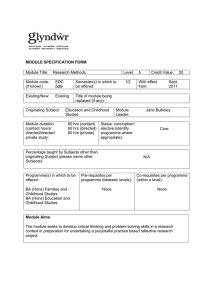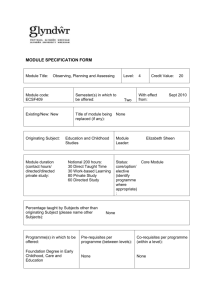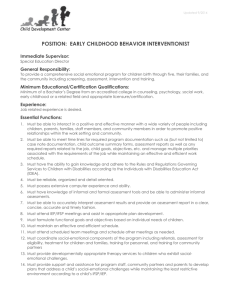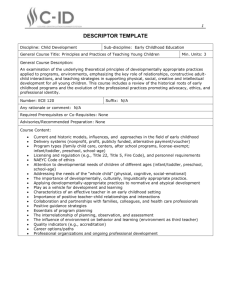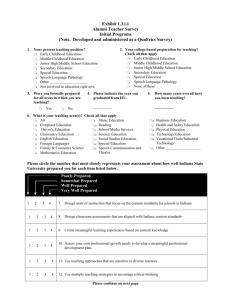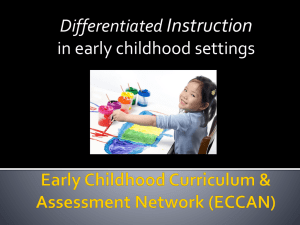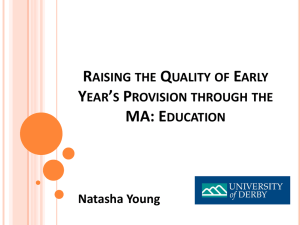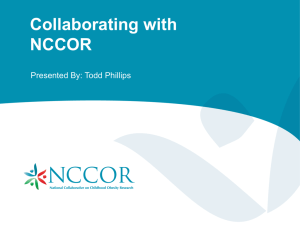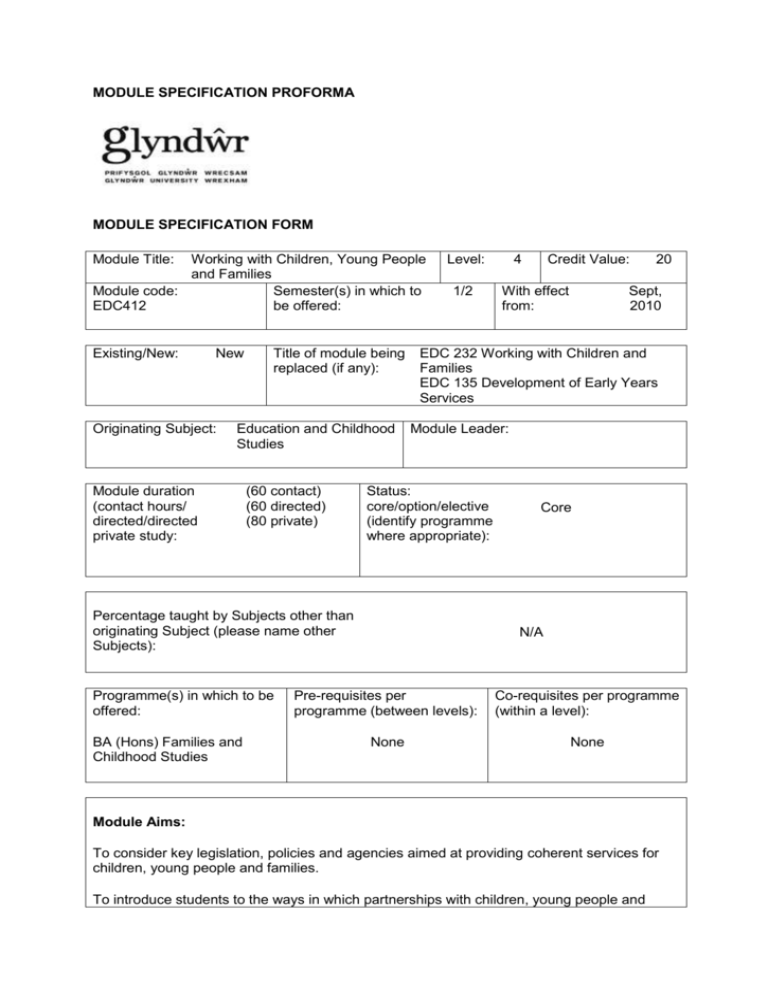
MODULE SPECIFICATION PROFORMA
MODULE SPECIFICATION FORM
Module Title:
Working with Children, Young People
and Families
Module code:
Semester(s) in which to
EDC412
be offered:
Existing/New:
New
Originating Subject:
Title of module being
replaced (if any):
Education and Childhood
Studies
Module duration
(contact hours/
directed/directed
private study:
(60 contact)
(60 directed)
(80 private)
Level:
1/2
BA (Hons) Families and
Childhood Studies
Credit Value:
With effect
from:
20
Sept,
2010
EDC 232 Working with Children and
Families
EDC 135 Development of Early Years
Services
Module Leader:
Status:
core/option/elective
(identify programme
where appropriate):
Percentage taught by Subjects other than
originating Subject (please name other
Subjects):
Programme(s) in which to be
offered:
4
Core
N/A
Pre-requisites per
programme (between levels):
Co-requisites per programme
(within a level):
None
None
Module Aims:
To consider key legislation, policies and agencies aimed at providing coherent services for
children, young people and families.
To introduce students to the ways in which partnerships with children, young people and
families can be fostered.
Expected Learning Outcomes
At the end of this module, students should be able to:
Knowledge and Understanding:
1. Examine the diversity of children’s/young people’s home lives and family structures;
2. Identify and discuss the roles of various statutory, private, voluntary and independent
agencies that support children, young people and families;
3. Outline and discuss key initiatives, policies and legislation linked to supporting and
working in partnership with children, young people and families;
4. Examine the reasons for, and ways in which, collaboration between children, young
people, families and agencies can be developed;
5. Discuss children’s and young people’s rights to participation; including any dilemmas and
difficulties involved.
6. Highlight the role of the practitioner and the skills required to enhance effective
relationships with children/young people, families and other agencies.
Transferable/Key Skills and other attributes:
Evaluation and reflection;
Communication;
Sharing ideas;
Listening;
Confidentiality;
Improving own learning and performance;
Analytical and problem solving skills;
Working with others.
Assessment: please indicate the type(s) of assessment (eg examination, oral, coursework,
project) and the weighting of each (%). Details of indicative assessment tasks must be
included.
Assessment- written essay, linked to the discussion of key issues of providing services for,
and working in partnership with, children, young people and families.
Assessment
1
Learning
Outcomes
to be met
All
Type of assessment
Learning and Teaching Strategies:
Essay
Weighting
100%
Word count or
equivalent if
appropriate
4,000
The teaching and learning strategies will employ a range of methods, including lecture,
seminar, student presentations and external speakers with specific areas of expertise.
Sessions will comprise of the presentation of information, reading, case studies, practical
activities, review of selected video/DVD material and discussion. Peer group and individual
discussion will allow the tutor to monitor the student’s ability to reflect upon and evaluate their
own ideas and practice via discussion groups, individual research and tutorials.
Syllabus outline:
This module seeks to develop students’ understanding of the key issues and models of good
practice in working with children, young people and families. Students will explore:
Key initiatives, policies and legislation linked to supporting and working in partnership
with children, young people and families.
The roles and interdisciplinary nature of key services that support children, young
people and families.
The diversity of children’s/young people’s home lives and family structures.
Children’s basic needs (Maslow, 1968).
Social and family circumstances, which can affect care-giving and make families
vulnerable (Common Assessment Framework).
Safeguarding- how past failings to support children and young people have influenced
a multi-agency/collaborative approach.
Parents/carers, children and young people as active participants. Reasons for, and
ways in which, practitioners can develop partnerships with children, families and other
agencies.
Children’s rights; including conflicts between participation and protection rights and
dilemmas of judging children’s competence in relation to participation (United Nations
Convention of the Rights of the Child; Every Child Matters; Rights to Action; Think
Family Strategy).
Strategies for listening to children and young people (including the Mosaic approach).
The role of the practitioner and the skills required to enhance effective relationships
children/young people, families and other agencies.
Bibliography
Essential reading:
Department of Health (2004), National Service Framework for Children, Young People and
Maternity Services. London: Department of Health.
Macleod-Brudenell, J. and Kay, J. (eds) (2008), Advanced Early Years. Second Edition.
London: Heinemann.
Waller, T. (ed) (2009), An Introduction to Early Childhood. Second Edition. London: Sage
Publications Ltd.
Welsh Assembly Government (2004), Children and Young People: Rights to Action. Cardiff:
Welsh Assembly Government.
Welsh Assembly Government (2005), A Fair Future for Our Children: The Strategy for
Tackling Child Poverty. Cardiff: Welsh Assembly Government.
Other indicative reading:
Ainning, A., Cotterall, D., Frost. N., Green, J. and Robinson, M. (2006), Developing Multiprofessional Teamwork for Integrated Children’s Services. Maidenhead: Open University
Press.
Alderson, P. (2008), Young Children’s Rights: Exploring Beliefs, Principles and Practice.
Second Edition. Jessica Kingsley Publishers.
Bronfenbrenner, U. (1979), The Ecology of Human Development: Experiments by Nature and
Design. London: Harvard University Press.
Cheminais, R. (2009), Effective Multi-Agency Partnerships: Putting Every Child Matters into
Practice. London: Sage Publication Ltd
Clark, A. and Moss, P. (2001), Listening to Young Children: The Mosaic Approach. London:
National Children’s Bureau.
Department for Children, Schools and Families/Department of Health (2009), Healthy Lives,
Brighter Futures: The Strategy for Children and Young People’s Health. London: DCSF.
Department for Education and Skills (2003), Every Child Matters. London: Department for
Education and Skills.
Department for Education and Skills (2004), Primary National Strategy. Parents: Partners in
Learning. Guidance for Schools. London: DfES Publications.
Digman, C. and Soan, S. (2008), Working with Parents: A Guide for Education Professionals.
London: Sage Publication Ltd.
Fitzgerald, D. and Kay, F. (2008), Working Together in Children’s Services. Oxon: David
Fulton Publishers.
Hobart, C. and Frankel, J. (2009), A Practical Guide to Working with Parents. Second Edition.
Nelson Thornes.
Johnston, J. and Nahmad-Williams, L. (2008), Early Childhood Studies. Harlow: Pearson
Longman.
Loreman, T. (2009), Respecting Childhood. London: Continuum International Publishing
Group.
Nurse, A. (ed) (2008), The New Early Years Professional: Dilemmas and Debates. Oxon:
David Fulton.
Pugh, G. and Duffy, B. (eds) (2010), Contemporary Issues in Early Years. Fifth Edition.
London: Sage Publications.
Scheider, J., Avis, M. and Leighton, P. (eds) (2007), Supporting Children and Families:
Lessons from Sure Start for Evidence-Based Practice in Health, Social Care and Education.
London: Jessica Kingsley Publishers.
Welsh Assembly Government (2002), Children and Young People: A Framework for
Partnership. Cardiff: Welsh Assembly Government.
Wild, M. and Mitchell, H. (eds) (2007), Early Childhood Studies. Exeter: Learning Matters.
Willian, J., Parker-Rees, R. and Savage, J. (eds) (2004), Early Childhood Studies. Exeter:
Learning Matters.
Woodhead, M. and Montgomery, H. (eds) (2003), Understanding Childhood: An
Interdisciplinary Approach. Chichester: John Wiley and Sons and The Open University Press.
Yelland, N. (ed) (2005), Critical Issues in Early Childhood Education. Maidenhead: Open
University Press.
Journals:
Children and Society. Oxford: Wiley-Blackwell
Child Development – Society for Research in Child Development. Oxford: Wiley-Blackwell
Child: Care Health and Development. Oxford: Wiley-Blackwell
Child Right. Essex: The Children’s Legal Centre
Early Years Educator. MA Education Limited www.earlyyearseducator.co.uk
Early Years – An International Journal of Research and Development. Oxon: Routledge
www.tactyc.org.uk
Journal of Early Childhood Research. London: Sage
Nursery World. TSL Education Ltd. www.nurseryworld.co.uk
Useful web-sites:
www.parentinguk.org
www.unicef.org.uk
www.childcomwales.org.uk
www.parentsadvicecentre.org


